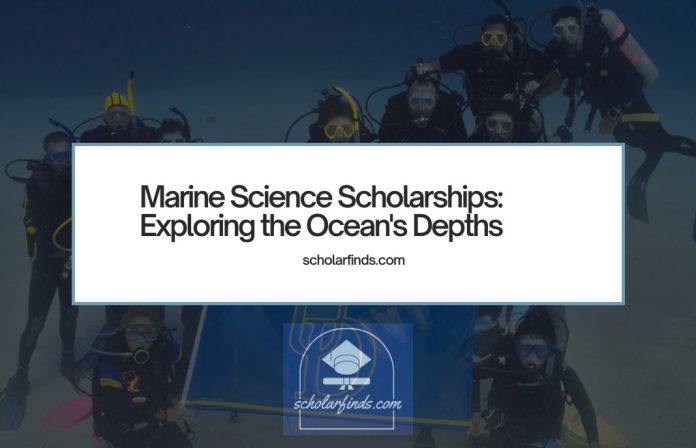Introduction
Marine Science Scholarships: Exploring the Ocean’s Depths – Marine science is crucial for understanding and preserving the vast and mysterious underwater world. This field encompasses various disciplines that study the ocean’s physical, chemical, geological, and biological aspects, contributing to our knowledge of marine ecosystems and their conservation. Scholarships in marine science are essential for nurturing the next generation of researchers and professionals, providing them with the resources needed to advance their studies and contribute to critical research. This article explores the various facets of marine science and highlights the scholarships that empower students to delve into oceanography, marine biology, conservation, and sustainable fisheries management.
Oceanography
Oceanography is the comprehensive study of the ocean, including its physical properties, chemical composition, geological structure, and biological organisms. This field is vital for understanding marine environments and their influence on global climate and weather patterns.
Scholarships such as the National Oceanic and Atmospheric Administration (NOAA) Hollings Scholarship and the Society for Ocean Sciences (SOS) Research Grant support students pursuing research in oceanography. These programs provide funding, mentorship, and access to advanced research facilities, enabling students to work on projects like studying ocean currents, investigating marine pollution, and exploring deep-sea ecosystems.
For example, a scholarship recipient at the Scripps Institution of Oceanography conducted research on the impact of climate change on ocean circulation patterns, providing valuable insights into how warming temperatures affect global weather systems. Another project at Woods Hole Oceanographic Institution focused on mapping underwater volcanic activity, contributing to our understanding of geological processes beneath the ocean floor.
Marine Biology
Marine biology focuses on the study of marine organisms, their behaviors, and their interactions with the environment. This field is essential for understanding the biodiversity of marine ecosystems and the impacts of human activities on marine life.
Scholarships like the Dr. Nancy Foster Scholarship Program and the Marine Conservation Society (MCS) Student Research Grant provide support for students specializing in marine biology. These scholarships offer financial aid, research opportunities, and internships, helping students gain practical experience in marine research and conservation.
One notable project funded by marine biology scholarships is the study of coral bleaching events and their impact on marine biodiversity. Another example is research into the behavior and migration patterns of marine mammals, which helps inform conservation strategies for endangered species.
Conservation and Coral Reefs
Marine conservation is critical for protecting ocean ecosystems and ensuring the sustainability of marine resources. Coral reefs, in particular, are biodiversity hotspots that provide essential habitat for many marine species.
Scholarships such as the Coral Reef Conservation Program (CRCP) and the Save Our Seas Foundation Grant support students engaged in marine conservation and coral reef studies. These programs provide funding, research opportunities, and support for conservation initiatives.
Examples of scholarship-supported projects in marine conservation include the restoration of damaged coral reefs through coral gardening and the development of marine protected areas (MPAs) to safeguard vulnerable ecosystems. A notable project at the University of Queensland focused on assessing the health of the Great Barrier Reef and implementing strategies to mitigate the impacts of climate change and human activities.
Sustainable Fisheries Management
Fisheries science is essential for the sustainable management of marine resources, ensuring that fish populations remain healthy and productive. This field involves studying fish populations, their habitats, and the impacts of fishing practices.
Scholarships like the Fisheries Society of the British Isles (FSBI) Studentship and the NOAA Fisheries-Sea Grant Fellowship support students pursuing careers in fisheries science. These scholarships provide funding, research opportunities, and internships, helping students develop sustainable fisheries management strategies.
For instance, a scholarship-funded project at Oregon State University focused on developing sustainable fishing practices that minimize bycatch and protect endangered species. Another project involved assessing the impacts of overfishing on fish populations and implementing measures to promote recovery and sustainability.
Top Marine Science Scholarships
Several prestigious scholarships are available for students pursuing marine science studies. Some notable programs include:
- NOAA Hollings Scholarship: Supports undergraduate students in marine science and related fields.
- Dr. Nancy Foster Scholarship Program: Provides funding for graduate students in marine biology, oceanography, and maritime archaeology.
- Coral Reef Conservation Program (CRCP): Offers grants for research and conservation projects focused on coral reefs.
- Save Our Seas Foundation Grant: Supports marine conservation initiatives and research projects.
- Fisheries Society of the British Isles (FSBI) Studentship: Provides funding for research in fisheries science.
Eligibility criteria for these scholarships typically include academic excellence, research experience, and a demonstrated commitment to the field. Applicants should carefully review the requirements and deadlines, and seek guidance from mentors to strengthen their applications.
Conclusion
Marine science scholarships are essential for fostering innovation and progress in a field that explores the depths of the ocean. By supporting the education and research of talented students, these scholarships ensure continuous advancements in oceanography, marine biology, conservation, and sustainable fisheries management. Students passionate about marine science are encouraged to explore these opportunities, contribute to transformative projects, and help protect and preserve our oceans for future generations.



